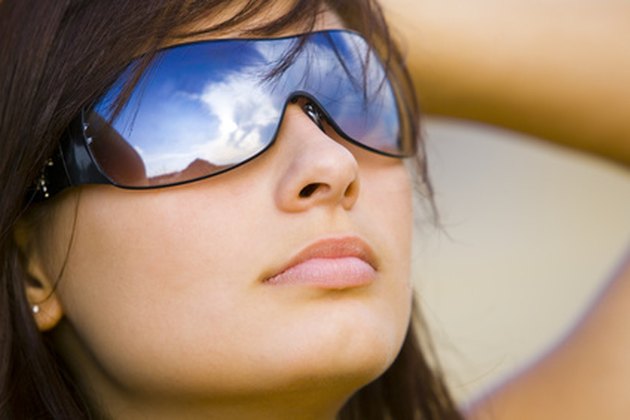Why Does the Sun Make Your Skin Darker But Your Hair Lighter?
Why Does the Sun Make Your Skin Darker But Your Hair Lighter?
Skin and hair react differently to sunlight. Typically, the skin darkens and the hair lightens, a result of a pigment in the human body called melanin. Melanin darkens the skin to protect it from harmful solar radiation. Because hair cells are not alive like skin cells are, melanin cannot protect hair from sun damage. Hair takes on a bleached appearance, while skin becomes darker. Precautions should be taken to limit exposure to ultraviolet light to prevent skin and hair damage.

Sunlight =

Some of the sun’s rays are beneficial, but others, such as ultraviolet rays, are hazardous. This radiation comes in three forms: ultraviolet A (UVA), ultraviolet B (UVB) and ultraviolet C (UVC). The earth’s atmosphere filters out UVC radiation, but UVA and UVB affect you every day. UVB affects the top layers of skin, while UVA penetrates to the deeper layers. Your hair and your skin are negatively affected by these UV rays, although they appear to react differently.
Melanin=
A pigment called melanin determines the color of your skin and hair. One form of melanin is a reddish-yellow color, while the other is brownish-black. The amount of each type of melanin you have in your skin and hair is genetically determined. Melanin protects your skin from the sun’s harmful ultraviolet A and B rays by turning it a darker color. People with very little melanin often acquire no tan and are at the greatest risk for sunburn, premature skin aging and skin cancer. People with dark skin should also be cautious about sun exposure.
Skin=
Your skin is the largest organ in your body. It protects you from the sun’s harmful rays by producing the pigment melanin to darken your skin. Ultraviolet rays in sunlight destroy the melanin in your skin, which triggers your body to produce more and darker melanin. This melanin reaction to ultraviolet rays can cause sunburn or suntan. UV radiation also causes the skin to coarsen and wrinkle, making even young skin look and feel old.
Hair =
Most of the hair on your body is made up of dead cells. Only the root is living, and once the hair emerges from the skin, the cells die. Melanin determines the color of your hair. People with very little melanin have blonde hair, while people with a great deal of melanin have black hair. Unlike the skin, which can regenerate melanin after UV damage, your hair is dead and can no longer make melanin. Sunlight kills the melanin in your hair and fades out the color, making it lighter and lighter. Your new hair will be as dark as before, since it contains the correct amount of melanin.
Precautions=
Although light-skinned, light-eyed people are at the greatest risk from UV radiation, the Skin Cancer Foundation urges everyone to limit their exposure. Wearing sunscreens, broad-brimmed hats, tightly-woven, loose clothing and sunglasses helps fend off UV rays. Keeping out of the sun as much as possible is the best option. This is especially true from 10:00 a.m. to 4:00 p.m. in the Northern Hemisphere.
Comments